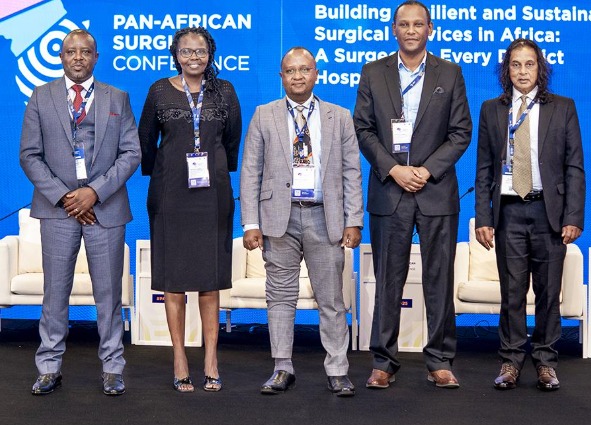Africa is on the brink of a severe healthcare crisis. Projections indicate that by 2030, the continent will face a shortage of six million surgical care providers, leaving countless individuals without access to essential, life-saving procedures. This alarming statistic was a focal point at the recent Pan-African Surgical Conference (PASC2025), convened by the medical charity Operation Smile. The conference, themed “Building Resilient and Sustainable Surgical Services in Africa: A Surgeon in Every District Hospital,” emphasized the urgent need to bolster Africa’s surgical workforce and develop tailored solutions to bridge the gaps in local surgical ecosystems.
The Current Landscape of Surgical Care in Africa
The disparity between the growing population and the availability of surgical professionals in Africa is stark. Several factors contribute to this widening gap:
- Limited Training Opportunities: Many African countries lack sufficient medical schools and training programs specializing in surgery. This inadequacy results in a minimal number of new surgeons entering the workforce annually.
- Brain Drain: Attractive opportunities abroad lure many trained surgeons away from their home countries, exacerbating the shortage.
- Resource Constraints: Insufficient funding for healthcare infrastructure and surgical facilities hampers the ability to train and retain surgical professionals.
For instance, as of 2007, Tanzania, with a population of 36 million, had only 100 surgeons, a third of whom had left the country. Similarly, Ethiopia, with over 75 million people, had just 144 surgeons. These statistics underscore the critical need for systemic changes to address the shortage of surgical care providers.
Highlights from PASC2025
The five-day PASC2025 conference brought together medical practitioners, policy experts, researchers, and other key stakeholders to deliberate on actionable strategies. Key discussions and insights included:
- Collaborative Efforts: Professor Faustin Ntirenganya, a senior consultant general and onco-plastic surgeon at the University of Rwanda and co-chair of the conference, emphasized the power of collaboration. He stated, “This conference is not just about discussions; it is a call to action for a shared vision of access to quality healthcare.”
- Global Partnerships: Ms. Billy Magee, conference co-chair and chief medical officer of Operation Smile, highlighted the necessity of international support. She called upon global corporations, philanthropies, charities, and developed nations to assist Africa in training local surgical practitioners.
- Innovative Training Models: Discussions centered on adopting innovative solutions in healthcare infrastructure, policy advocacy for surgical access, and strategies for enhancing surgical training and research in Africa.
Case Study: IRCAD Africa
A tangible example of progress is the establishment of IRCAD Africa, a research and training center for minimally invasive surgery, which opened in Masaka, near Kigali, Rwanda, in October 2023. This center, the first of its kind on the continent, has already trained 300 students from 27 African countries. Equipped with advanced facilities, including an amphitheater and 16 operating tables for practical exercises, IRCAD Africa offers intensive theoretical and practical training. The center’s focus on minimally invasive surgery is particularly beneficial, as it reduces blood loss, accelerates healing, and minimizes infection risks, enabling patients to recover and leave the hospital more quickly.
The Role of Operation Smile
Operation Smile has been instrumental in addressing the surgical care deficit in Africa since 1987. Operating in 12 African countries, the organization focuses on building a sustainable surgical workforce through strategic partnerships. Their collaborative approach involves working closely with local healthcare providers, ministries of health, governments, NGOs, corporations, and academic institutions to exchange ideas and scale up Africa’s next generation of surgeons and anesthesiologists. In 2025, Operation Smile plans to expand its efforts to Tanzania, further extending its impact on the continent.
Strategies for Building a Resilient Surgical Workforce
To effectively address the impending crisis, a multifaceted approach is essential:
- Enhancing Training Programs: Establishing and supporting medical schools and specialized training centers across Africa to increase the number of qualified surgical professionals.
- Retaining Talent: Implementing policies and providing incentives to retain trained surgeons within their home countries, thereby reducing brain drain.
- Strengthening Infrastructure: Investing in healthcare infrastructure to ensure that facilities are equipped to support surgical procedures and training programs.
- Fostering Public-Private Partnerships: Encouraging collaboration between governments, non-profits, and the private sector to mobilize resources for surgical training and healthcare infrastructure.
- Leveraging Technology: Expanding access to telemedicine and digital surgical training platforms to supplement in-person learning and mentorship for aspiring surgeons.
The findings presented at PASC2025 underscore the urgent need for systemic change to avert Africa’s looming surgical workforce crisis. Without decisive action, millions will continue to lack access to essential surgical care, deepening existing healthcare disparities. By investing in training, fostering collaboration, and strengthening infrastructure, Africa can take significant strides toward achieving equitable surgical access.





